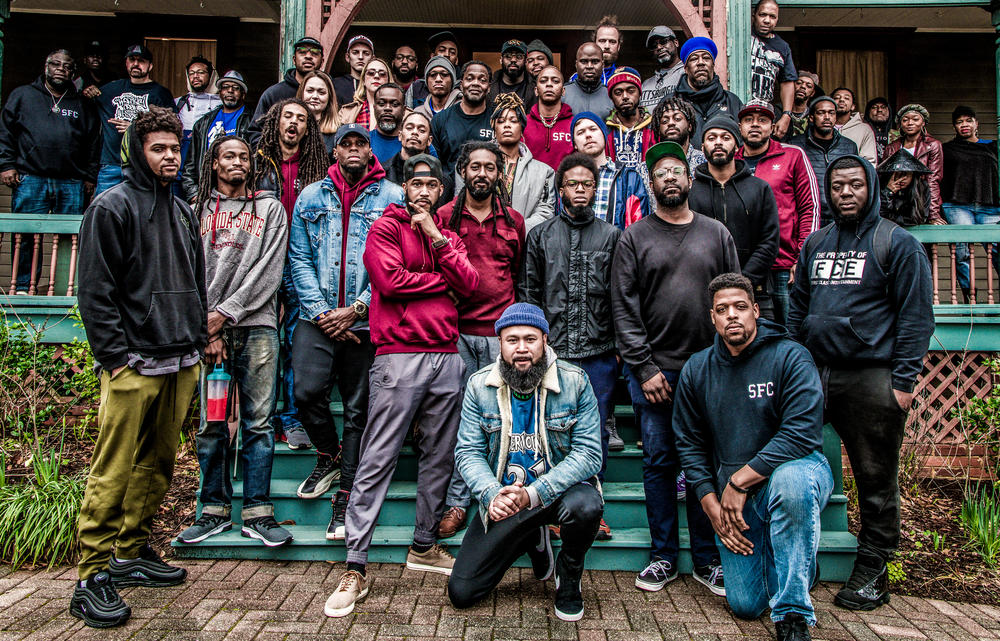Section Branding
Header Content
Freestyle Rap Nonprofit 'Soul Food Cypher' Uses Power Of Words To Sharpen Minds — And Communities
Primary Content
Every month, a group of budding Atlanta lyricists — some veterans, some novices — gather together, form a circle, and start rapping. It’s an experience the group’s founder, Alex 'Cost 1’ Acosta, has described as akin to “hip-hop church.”
The monthly gathering is just one offshoot of the freestyle rap nonprofit Soul Food Cypher, which aims to use the power of words to transform individual lives — with ripple effects into their broader communities.
'On Second Thought' host Virginia Prescott speaks with Alex 'Cost 1' Acosta and Eric 'Zano' Ludgood.
Soul Food Cypher co-founders Alex 'Cost 1' Acosta and Eric 'Zano' Ludgood joined On Second Thought to share more about the origins and vision for the group. The group celebrates its eighth anniversary this month, with an anniversary cypher this Sunday, Feb. 23.
INTERVIEW HIGHLIGHTS
On the difference between rap battles and a “cypher”
Acosta: A battle rap, or a rap battle in particular, is a show in which you have two rappers, — or we call them emcees — and they trade insults to one another. It’s all about tearing down your opponent.
The cypher is a microcosm of our community, because you have community leaders — which are those emcees — taking turns to talk about who they are, where they're from. But, the flow of the cypher depends on the last person who goes. So essentially, people are sharing a rhyme, but they're building [up] each other in the circle. We wanted to create a safe and nurturing environment for the craft to be able to grow, and also provide an outlet for emcees, other than just battle rapping.
On the history of cyphers and how Ludgood joined the organization
Ludgood: Cyphers — you can trace that back, all the way back to even Africa. Dancing in a circle, ring-shouting even in African-American church call-and-response. The way I came in contact with the cypher was, I was about to start my own cypher, because I'd been emceeing around Atlanta for a long time, and I didn't have anybody to freestyle with. I had chosen a date and time and I put some feelers out. Turns out, Soul Food Cypher was always already happening on Sundays, which was the day I wanted it. And so I reached out to Alex. He was like, ‘well, why don't you come to our cypher?’ And I did. I've been with the organization ever since.
On how Soul Food Cypher draws upon history and tradition
Acosta: So, our cyphers take place every fourth Sunday. And there's a reason that it takes place on Sunday. Those that were enslaved in New Orleans in the 1800s, due to the noir codes at the time, they weren’t working on Sundays. That doesn’t make slavery any less harsh, just because they didn’t work on Sundays. However, because of this free day, they gathered together in Congo Square on Sundays.
Prescott: Thought to be some of the roots of jazz and rhythm and blues music!
Acosta: Exactly. And a lot of our music forms, in the black community here in America, is rooted in improvisation. But it was here at this central point, Congo Square, that jazz was formed. [In] the [Mississippi] Delta, you have the blues. So, there’s something powerful about coming together on Sundays — that is part of our music tradition, and also our histories as well. So, we want to be able to continue what our ancestors did and be able to improvise, be able to feel the spirit of each other in community. Because in Congo Square, you had some of the early cyphers. And so we’re continuing that tradition.
On how the educational value of cyphers
Acosta: Our most popular segment is Wordplay. And with Wordplay, we put words and images on the screen, so that the emcees can improvise in real time [...]
Prescott: So like giving them a prompt, kind of thing?
Acosta: Exactly. So as soon as the crowd sees it [the prompt], the emcees sees it at the same time. So you get to see the ingenuity, [and] you get to see the lyrical dexterity of the emcees. And these aren't just your average words. These are SAT level words. These are also historical figures. These are also current events. So, at the same time that the emcee is performing and entertaining, we're also providing education as well.
On helping emcees find their authentic voice
Ludgood: We’re constantly putting them on the spot. I mean, that’s like the essence of freestyling [...] being ready, like at any time to go, you know, on any kind of beat. And the more you do it, the more you realize, ‘Oh, well I like this kind of cadence,’ or, ‘These kinds of words reflect me,’ or, ‘This inflection is a big part of who I am, and my background.’ And that comes out, especially with the exercises. So, that’s how we do it — we do it through the actual cypher itself. We try to sharpen the emcees with the actual activities that we're asking them to do.
On the connection between freestyling and faith
Acosta: Freestyle rap is not necessarily celebrated as much as it has been in the past. But with freestyle rap, you can not only tell an emcee’s skill, but you can also tell their soul — what they freestyle about, [or] what they’re thinking. You get spotlight into an emcee’s state of mind. But also, what's special about freestyle is that it's one of the greatest displays of faith. To be able just to have the faith that the next word is going to come out, and not only make sense, but also rhyme, and also be on time? It's a great display of faith.
Get in touch with us.
Twitter: @OSTTalk
Facebook: OnSecondThought
Email: OnSecondThought@gpb.org
Phone: 404-500-9457



